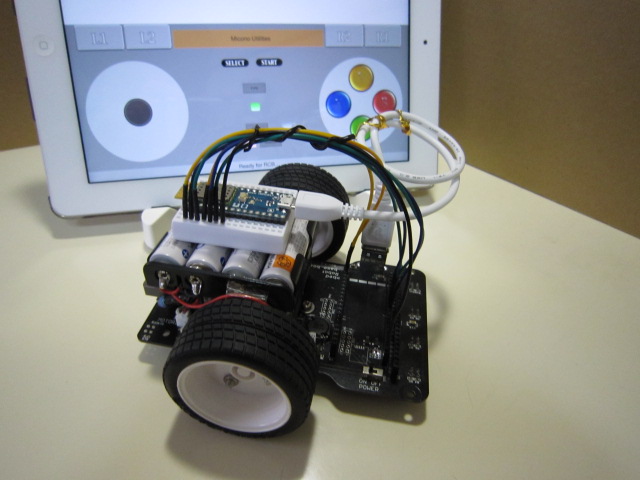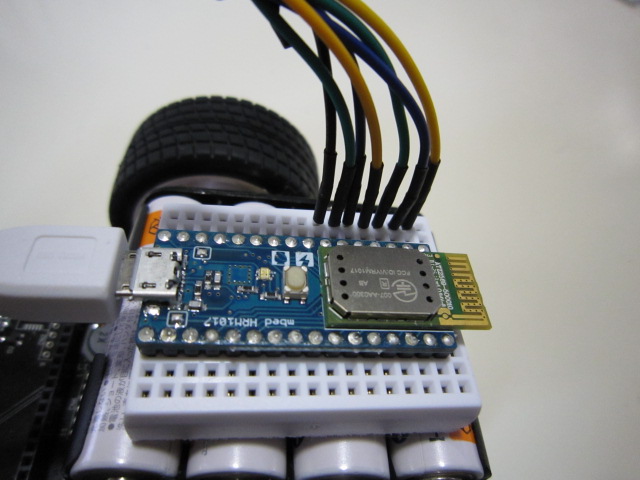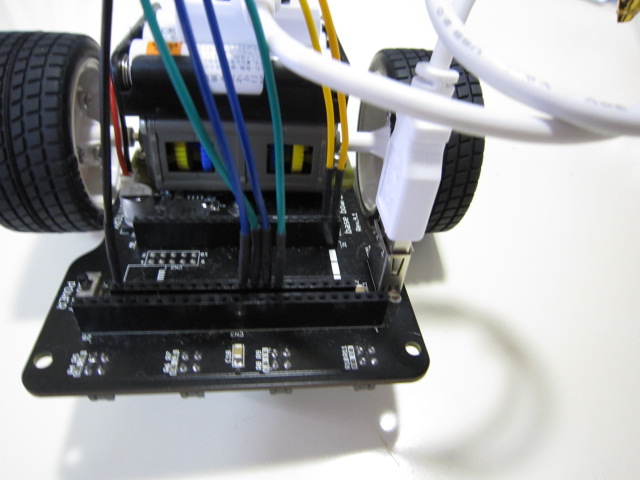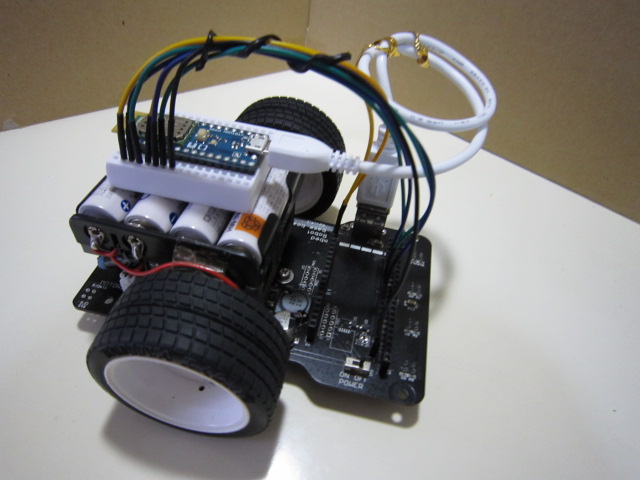RCBControllerでモータを制御します。うおーるぼっとも動かせました。
Dependencies: BLE_API TB6612FNG2 mbed nRF51822
Fork of BLE_RCBController2 by
うまく接続できない時は、iPhone/iPadのBluetoothをOFF->ONしてキャッシュをクリアしてみてください。
ライブラリ類をUpdateするとコンパイル出来なくなります。インポートした物をそのまま使って下さい。
RCBControllerでうおーるぼっとを操縦する例

RCBControllerでの操縦は次の4種類あります。 それぞれうおーるぼっとの動きが異なりますので試してみてください。
- 左十字ボタン
- 左のみアナログ
- 右のみアナログ
- 両方アナログ
うおーるぼっと(LPC1768のソケット)とHRM1017の接続はこれです。
LPC1768 ー HRM1017
p11 ーーー P0_0
p12 ーーー P0_1
p13 ーーー P0_28
p14 ーーー P0_29
p21 ーーー P0_30
p22 ーーー P0_25
GND ーーー GND


HRM1017の電源はうおーるぼっとのUSBコネクタからとります。

Diff: nRF51822/common/common.h
- Revision:
- 1:48f6e08a3ac2
- Parent:
- 0:8c643bfe55b7
--- /dev/null Thu Jan 01 00:00:00 1970 +0000
+++ b/nRF51822/common/common.h Wed Aug 20 13:24:20 2014 +0000
@@ -0,0 +1,236 @@
+/**************************************************************************/
+/*!
+ @file common.h
+ @author hathach (tinyusb.org)
+
+ @section LICENSE
+
+ Software License Agreement (BSD License)
+
+ Copyright (c) 2013, K. Townsend (microBuilder.eu)
+ All rights reserved.
+
+ Redistribution and use in source and binary forms, with or without
+ modification, are permitted provided that the following conditions are met:
+ 1. Redistributions of source code must retain the above copyright
+ notice, this list of conditions and the following disclaimer.
+ 2. Redistributions in binary form must reproduce the above copyright
+ notice, this list of conditions and the following disclaimer in the
+ documentation and/or other materials provided with the distribution.
+ 3. Neither the name of the copyright holders nor the
+ names of its contributors may be used to endorse or promote products
+ derived from this software without specific prior written permission.
+
+ THIS SOFTWARE IS PROVIDED BY THE COPYRIGHT HOLDERS ''AS IS'' AND ANY
+ EXPRESS OR IMPLIED WARRANTIES, INCLUDING, BUT NOT LIMITED TO, THE IMPLIED
+ WARRANTIES OF MERCHANTABILITY AND FITNESS FOR A PARTICULAR PURPOSE ARE
+ DISCLAIMED. IN NO EVENT SHALL THE COPYRIGHT HOLDER BE LIABLE FOR ANY
+ DIRECT, INDIRECT, INCIDENTAL, SPECIAL, EXEMPLARY, OR CONSEQUENTIAL DAMAGES
+ INCLUDING, BUT NOT LIMITED TO, PROCUREMENT OF SUBSTITUTE GOODS OR SERVICES;
+ LOSS OF USE, DATA, OR PROFITS; OR BUSINESS INTERRUPTION HOWEVER CAUSED AND
+ ON ANY THEORY OF LIABILITY, WHETHER IN CONTRACT, STRICT LIABILITY, OR TORT
+ INCLUDING NEGLIGENCE OR OTHERWISE ARISING IN ANY WAY OUT OF THE USE OF THIS
+ SOFTWARE, EVEN IF ADVISED OF THE POSSIBILITY OF SUCH DAMAGE.
+*/
+/**************************************************************************/
+
+/** \defgroup Group_Common Common Files
+ * @{
+ *
+ * \defgroup Group_CommonH common.h
+ *
+ * @{
+ */
+
+#ifndef _COMMON_H_
+#define _COMMON_H_
+
+#ifdef __cplusplus
+ extern "C" {
+#endif
+
+//--------------------------------------------------------------------+
+// INCLUDES
+//--------------------------------------------------------------------+
+
+//------------- Standard Header -------------//
+#include <stdint.h>
+#include <stdbool.h>
+#include <stddef.h>
+#include <string.h>
+#include <stdio.h>
+
+//------------- General Header -------------//
+#include "projectconfig.h"
+#include "compiler.h"
+#include "assertion.h"
+#include "binary.h"
+#include "ble_error.h"
+
+//------------- MCU header -------------//
+//#include "nrf.h"
+
+//--------------------------------------------------------------------+
+// TYPEDEFS
+//--------------------------------------------------------------------+
+typedef unsigned char byte_t;
+typedef float float32_t;
+typedef double float64_t;
+
+//--------------------------------------------------------------------+
+// MACROS
+//--------------------------------------------------------------------+
+#define STRING_(x) #x // stringify without expand
+#define XSTRING_(x) STRING_(x) // expand then stringify
+#define STRING_CONCAT_(a, b) a##b // concat without expand
+#define XSTRING_CONCAT_(a, b) STRING_CONCAT_(a, b) // expand then concat
+
+#define U16_HIGH_U8(u16) ((uint8_t) (((u16) >> 8) & 0x00ff))
+#define U16_LOW_U8(u16) ((uint8_t) ((u16) & 0x00ff))
+#define U16_TO_U8S_BE(u16) U16_HIGH_U8(u16), U16_LOW_U8(u16)
+#define U16_TO_U8S_LE(u16) U16_LOW_U8(u16), U16_HIGH_U8(u16)
+
+#define U32_B1_U8(u32) ((uint8_t) (((u32) >> 24) & 0x000000ff)) // MSB
+#define U32_B2_U8(u32) ((uint8_t) (((u32) >> 16) & 0x000000ff))
+#define U32_B3_U8(u32) ((uint8_t) (((u32) >> 8) & 0x000000ff))
+#define U32_B4_U8(u32) ((uint8_t) ((u32) & 0x000000ff)) // LSB
+
+#define U32_TO_U8S_BE(u32) U32_B1_U8(u32), U32_B2_U8(u32), U32_B3_U8(u32), U32_B4_U8(u32)
+#define U32_TO_U8S_LE(u32) U32_B4_U8(u32), U32_B3_U8(u32), U32_B2_U8(u32), U32_B1_U8(u32)
+
+//--------------------------------------------------------------------+
+// INLINE FUNCTION
+//--------------------------------------------------------------------+
+#define memclr_(buffer, size) memset(buffer, 0, size)
+
+//------------- Conversion -------------//
+/// form an uint32_t from 4 x uint8_t
+static inline uint32_t u32_from_u8(uint8_t b1, uint8_t b2, uint8_t b3, uint8_t b4) ATTR_ALWAYS_INLINE ATTR_CONST;
+static inline uint32_t u32_from_u8(uint8_t b1, uint8_t b2, uint8_t b3, uint8_t b4)
+{
+ return (b1 << 24) + (b2 << 16) + (b3 << 8) + b4;
+}
+
+static inline uint8_t u16_high_u8(uint16_t u16) ATTR_CONST ATTR_ALWAYS_INLINE;
+static inline uint8_t u16_high_u8(uint16_t u16)
+{
+ return (uint8_t) ((u16 >> 8) & 0x00ff);
+}
+
+static inline uint8_t u16_low_u8(uint16_t u16) ATTR_CONST ATTR_ALWAYS_INLINE;
+static inline uint8_t u16_low_u8(uint16_t u16)
+{
+ return (uint8_t) (u16 & 0x00ff);
+}
+
+//------------- Min -------------//
+static inline uint8_t min8_of(uint8_t x, uint8_t y) ATTR_ALWAYS_INLINE ATTR_CONST;
+static inline uint8_t min8_of(uint8_t x, uint8_t y)
+{
+ return (x < y) ? x : y;
+}
+
+static inline uint16_t min16_of(uint16_t x, uint16_t y) ATTR_ALWAYS_INLINE ATTR_CONST;
+static inline uint16_t min16_of(uint16_t x, uint16_t y)
+{
+ return (x < y) ? x : y;
+}
+
+static inline uint32_t min32_of(uint32_t x, uint32_t y) ATTR_ALWAYS_INLINE ATTR_CONST;
+static inline uint32_t min32_of(uint32_t x, uint32_t y)
+{
+ return (x < y) ? x : y;
+}
+
+//------------- Max -------------//
+static inline uint32_t max32_of(uint32_t x, uint32_t y) ATTR_ALWAYS_INLINE ATTR_CONST;
+static inline uint32_t max32_of(uint32_t x, uint32_t y)
+{
+ return (x > y) ? x : y;
+}
+
+//------------- Align -------------//
+static inline uint32_t align32 (uint32_t value) ATTR_ALWAYS_INLINE ATTR_CONST;
+static inline uint32_t align32 (uint32_t value)
+{
+ return (value & 0xFFFFFFE0UL);
+}
+
+static inline uint32_t align16 (uint32_t value) ATTR_ALWAYS_INLINE ATTR_CONST;
+static inline uint32_t align16 (uint32_t value)
+{
+ return (value & 0xFFFFFFF0UL);
+}
+
+static inline uint32_t align_n (uint32_t alignment, uint32_t value) ATTR_ALWAYS_INLINE ATTR_CONST;
+static inline uint32_t align_n (uint32_t alignment, uint32_t value)
+{
+ return value & (~(alignment-1));
+}
+
+static inline uint32_t align4k (uint32_t value) ATTR_ALWAYS_INLINE ATTR_CONST;
+static inline uint32_t align4k (uint32_t value)
+{
+ return (value & 0xFFFFF000UL);
+}
+
+static inline uint32_t offset4k(uint32_t value) ATTR_ALWAYS_INLINE ATTR_CONST;
+static inline uint32_t offset4k(uint32_t value)
+{
+ return (value & 0xFFFUL);
+}
+
+//------------- Mathematics -------------//
+/// inclusive range checking
+static inline bool is_in_range(uint32_t lower, uint32_t value, uint32_t upper) ATTR_ALWAYS_INLINE ATTR_CONST;
+static inline bool is_in_range(uint32_t lower, uint32_t value, uint32_t upper)
+{
+ return (lower <= value) && (value <= upper);
+}
+
+/// exclusive range checking
+static inline bool is_in_range_exclusive(uint32_t lower, uint32_t value, uint32_t upper) ATTR_ALWAYS_INLINE ATTR_CONST;
+static inline bool is_in_range_exclusive(uint32_t lower, uint32_t value, uint32_t upper)
+{
+ return (lower < value) && (value < upper);
+}
+
+static inline uint8_t log2_of(uint32_t value) ATTR_ALWAYS_INLINE ATTR_CONST;
+static inline uint8_t log2_of(uint32_t value)
+{
+ uint8_t result = 0; // log2 of a value is its MSB's position
+
+ while (value >>= 1)
+ {
+ result++;
+ }
+ return result;
+}
+
+// return the number of set bits in value
+static inline uint8_t cardinality_of(uint32_t value) ATTR_ALWAYS_INLINE ATTR_CONST;
+static inline uint8_t cardinality_of(uint32_t value)
+{
+ // Brian Kernighan's method goes through as many iterations as there are set bits. So if we have a 32-bit word with only
+ // the high bit set, then it will only go once through the loop
+ // Published in 1988, the C Programming Language 2nd Ed. (by Brian W. Kernighan and Dennis M. Ritchie)
+ // mentions this in exercise 2-9. On April 19, 2006 Don Knuth pointed out to me that this method
+ // "was first published by Peter Wegner in CACM 3 (1960), 322. (Also discovered independently by Derrick Lehmer and
+ // published in 1964 in a book edited by Beckenbach.)"
+ uint8_t count;
+ for (count = 0; value; count++)
+ {
+ value &= value - 1; // clear the least significant bit set
+ }
+
+ return count;
+}
+
+#ifdef __cplusplus
+ }
+#endif
+
+#endif /* _COMMON_H_ */
+
+/** @} */
+/** @} */
 robo 8080
robo 8080
